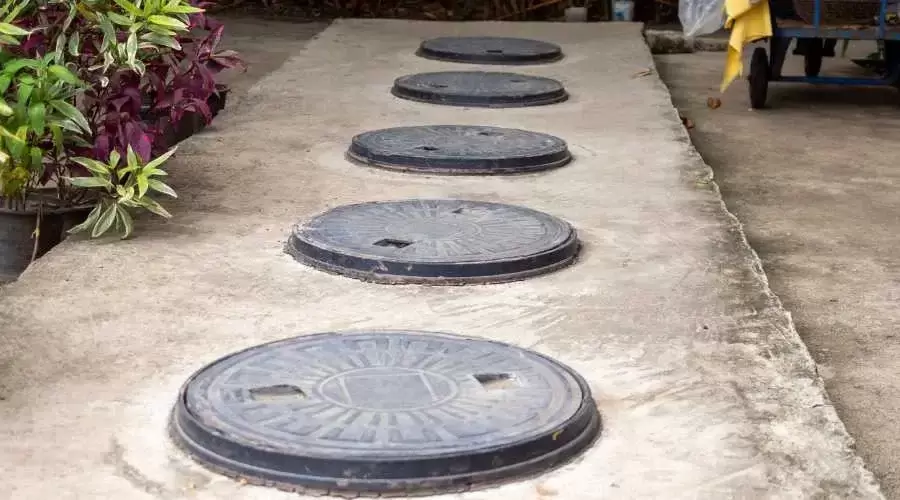You might be surprised to hear that your septic system requires the same method. We’ll talk about adding enzymes in this article to make your septic system as efficient and healthy as possible.
You may already be knowledgeable about septic systems if you own a home. These are subterranean tanks that store wastewater and solid waste separately until they can be properly disposed of. The major goal of these systems is to keep dangerous substances away from sources of drinking water, which is why regular maintenance is crucial. The failure of a septic system can contaminate drinking water, damage property, and make a tremendous mess.
How a Sewage System Operates
Anything that is flushed down a drain in your home with a septic system ends up in the septic tank on your land. Organic solid waste is gathered inside the tank and gradually converted into a liquid before being discharged into the drain field. Bacteria make this organic decomposition process possible. Yes, we are aware that germs are typically viewed as “bad.” But the ecosystem of the septic system needs and greatly benefits from these bacteria.
The issue arises when chemicals are introduced into the septic tank, killing or preventing the microorganisms from doing their function. You should refrain from administering the following compounds to a systemic system:
- Drain cleaners in a liquid
- Pesticides
- Chlorine
- Cooking oil or grease
- Hydrogen peroxide, bleach
- Gasoline
- Paint Medications
What Are Enzymes for Septic Systems?
In a sense, enzymes feed the microorganisms in your septic tank. To get them to the septic tank, flush them in a liquid or packet down the toilet. They aid in facilitating bacterial degradation of organic matter. Some enzyme products might even contain brand-new microorganisms or additional nutrients.
Benefits of Adding Septic System Enzymes
Your septic tank can function well if the bacteria are kept in good health. The organic waste in the tank will take longer to decompose without the bacteria. You will need to have the tank pumped more frequently as a result of this. Or you run the chance of experiencing a septic backup, which poses a serious health concern.
Even if you are very careful about what you put down the drain in your home, it’s not a terrible idea to add enzymes occasionally. Of course, these remedies don’t take the place of routine upkeep or tank pumping.
Septic Tank Upkeep
One of the most vital parts of your house is the septic tank. It operates around the clock to safely and effectively get rid of your home waste. Always avoid flushing anything down the drain that could harm the microorganisms in the tank if you want it to continue working properly. You should also have it serviced after a few years and have it checked regularly. If you don’t do that, you risk:
- Remove Back Up of Sewage Water: If your septic tank is neglected for an extended period of time, it might not be able to process all of the incoming waste. This may result in an overflow that backs up into the toilets and drains in your home.
- Flood-Proof Your Yard: Nobody wants to deal with a flooded yard. The water in your sewage system may overflow if your septic tank isn’t working properly, spilling into your driveway or yard. Untreated sewage may leak out of a septic system’s tanks and contaminate nearby groundwater or even your well water if it is not kept up properly.
- Deal With the Sewage Smell: The answer is not to hold your nose. Bad odors emanating from your septic tank are a symptom that the system needs to be maintained and is not operating as it should.
- Fix Property Damage: Your home is a significant investment that has to be safeguarded. Unfortunately, even a modest septic system malfunction can result in severe property damage and thousands of dollars in repair costs. You shouldn’t allow that to occur. You may be confident that your septic system will continue to function well for years with routine maintenance.
Pros of Routine Septic Tank Maintenance
Here are some of the factors that make maintaining your septic tank critical:
- Safeguards Your Health: Sewage backup in your house and yard can be caused by neglect. As a result of being exposed to untreated trash, you and your family may be at risk for health problems. In the event that you have a well, untreated sewage could also contaminate it with bacteria and other pollutants.
- Environmental Protection: Contamination of the groundwater resources and neighboring streams, rivers, and rivers might result from a failing septic system. Everyone in the community could be at risk for a public health hazard as a result of this. You may aid in reducing this risk to the environment by maintaining your septic tank.
- Reduces Costs: In contrast to dealing with repairs or septic tank replacement due to clogs, leaks, or other problems, septic tank maintenance is far less expensive. Regular upkeep will help your septic tank last longer and end up saving you money.
- Enhances Your Property’s Value: A well-maintained septic tank adds value to your home. Before buying a house, some purchasers want a septic tank examination and upkeep documentation. For prospective purchasers, a malfunctioning septic tank might be a deal-breaker.
An environment that is safe and healthy for living in requires regular septic tank repair. You can make sure that your septic system will continue to operate correctly and safely by taking the required precautions and performing routine maintenance. Your septic system will function more efficiently if you add enzymes since they aid the bacteria in the tank.
Service for Septic Systems in New Jersey
Call the experts at Elizabeth Drain Service if you have any inquiries regarding adding enzymes to your septic system or require septic tank maintenance. Since 1992, we’ve provided service to Elizabeth and the neighborhood. Call us at (908) 988-0365 right now.


